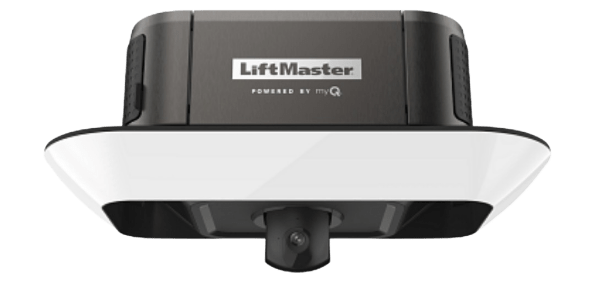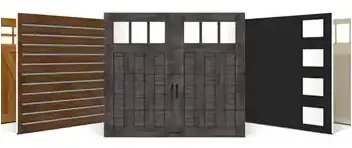
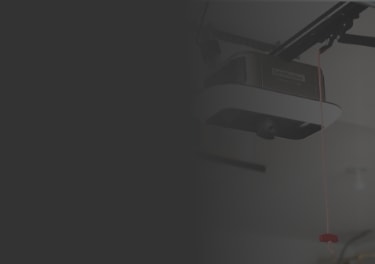
Have you come home and discovered your garage door is open, despite the fact that you’re sure you closed it when you left? Have you heard the garage door open from the comfort of your home, and wondered how it happened without your help? Garage doors that seem to have a mind of their own are said to be in “phantom operation.” In addition to giving you some unwanted anxiety, it can also be an unwelcome security risk — leaving everything in your garage available for all to access.
The good news is your worst fear — the chance of a ghost having full control of your garage doors — is not likely. And that popular urban legend that blames planes passing over your home probably isn’t the case, either. Instead, it’s likely an issue with your remote opener, frequency programming, electrical circuits, limit settings or sensors. While some of these problems are more extensive than others, a garage door technician can help solve all of them.
Fix My Garage Door1. Remote and Wall Button/Opener
The remote you use to open your garage door from your car is called a transmitter because it transmits the signal to the door to open. Make sure all the transmitters you use to open and close the garage door are working properly — pay close attention to buttons that could be sticking briefly or permanently. Don’t forget to check the wall buttons/openers. Stuck buttons can cause the signal to continue to fire, and the garage door to appear to randomly open or close.
Where do you keep the remote transmitters for the garage door? If you leave them somewhere that objects could easily push down the button — like a drawer — this could also be causing the unexplained garage door openings and closings. Dedicating time to checking all these buttons to ensure they’re working properly is a great place to start. You can also replace the batteries in your remote transmitter, as worn-out batteries have been known to send random signals, opening and closing your garage door without warning.
Stuck buttons and fresh batteries are two simple solutions, but when the buttons aren’t sticking and the batteries don’t make a difference, call a garage door professional to inspect your transmitters and your entire garage door system to fix whatever is broken.
2. Identical Frequencies/Codes
The signal transmitted to open your garage door travels on a specific frequency and uses a specific code to program. There’s a small chance a neighbor may be using the same garage door opener frequency or code. This problem only occurs in older garage door openers that were programmed using positioning clips. This case is easy to test — when they open their door, does yours open, too? If you discover this is the problem, your garage door will need to be set to a different frequency or your remote transmitters will need to be reprogrammed.
It is possible, but rare, for newer models to have a neighbor’s remote transmitter pair with your garage door openers. If you have a new model with an LCD control panel, chances are you can see the transmitters programmed to operate the garage door opener. If you find more than the ones you use, you’ve found the issue.
The solution is to clear the history and reprogram your transmitters. Each garage door opener manufacturer has a different way of reprogramming and/or switching the frequency, so reaching out to a garage door professional to make sure your frequencies and codes are set properly is the best way to get your garage door opening and closing on your time, not your neighbor’s.
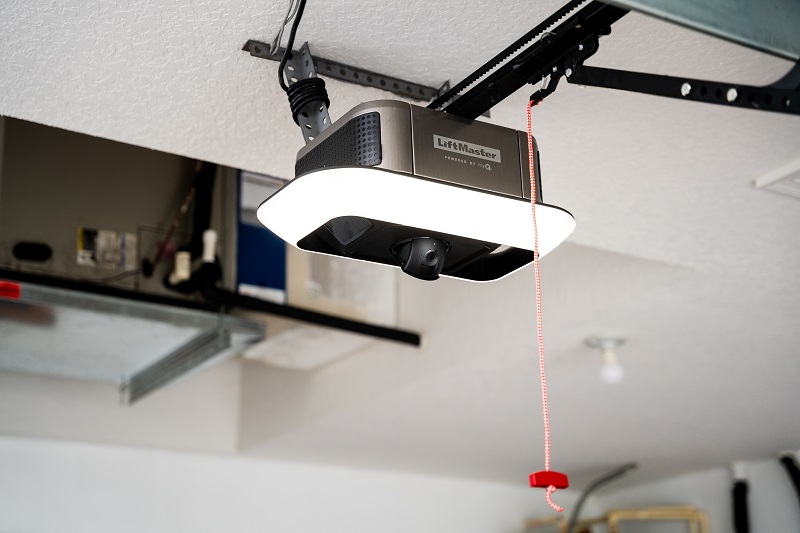
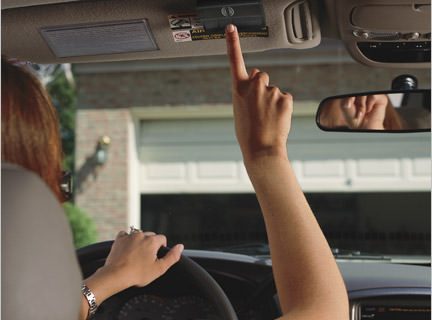
3. Debris and Buildup
Have you ever tried to close the garage door from the inside and run out, only to discover the garage door stops and opens back up? Your garage door has a safety feature known as a reversing mechanism — it’s a sensor located near the floor of your garage, right where the door closes. This sensor was designed to keep people and belongings safe from being crushed by the door — when it senses something in the way, it reverses the closing motion of the door, opening it again.
While this is a great feature, it can also be a nuisance. If your garage door is closing, and the sensor identifies a stick, rock or some other kind of debris, it will trigger the reverse mechanism. Look for debris or any items you store in your garage that might be too close to the threshold and preventing your garage door from closing all the way. A buildup of snow or ice could also be enough to block the sensor and trigger this mechanism. Weather is frequently the culprit of causing your garage door to keep opening on its own. Sometimes, it’s damage from weather. To make sure you don’t have build up or damage from weather interfering with your garage door operation, call in a professional to inspect it and fix anything that may be causing it to open and close on its own.
4. Misaligned Safety Sensors
If you clear all debris and any buildup from the sensors near the floor of your garage door tracks, but the motion of your garage door tends to be partially closing and then reversing and opening again, you may have a misaligned sensor. Your garage door most likely uses two sensors to trigger its reverse mechanism. These two sensors, often referred to as eyes, are located on either side of the garage door opening, and in some cases, they shoot a beam of light across the door. These sensors must be connected and aligned correctly in order for the garage door to work properly.
When the beam of light gets interrupted, it triggers the reverse mechanism — as usually, this would indicate something is in the way. However, it is possible these two sensors can become misaligned. If that occurs, there is not one solid beam of light because they are not pointing directly at one another. Therefore, it’s sending a message that something is in the way, triggering the reverse mechanism, despite the fact that there are no obstacles in its path.
The amber LED on the sending sensor will glow regardless of alignment or obstruction. If the green LED on the receiving sensor is off, dim, or flickering — and the light beam path is not obstructed — your sensors need to be aligned by a garage door technician. Typically issues with the safety sensor wiring occur because of a poor connection, incorrectly connected wires or a short in the wire from a staple.
If you suspect misaligned sensors may be the reason for your garage door opener that opens on its own, you should have a garage door technician come out and take a look. They can help you get everything back in place and ensure your garage door is working smoothly again.
5. Damaged Electrical Circuits
Weather can also have a negative impact on your garage door in another way. Thunderstorms, windstorms and other conditions can cause power outages and electrical surges. If you’ve recently experienced a power outage or surge, it may have damaged the electrical circuits that are responsible for opening and closing your garage door. This type of damage can lead to the garage door opening on its own — usually in a completely erratic manner.
There’s no easy fix for this issue. If you suspect recent weather conditions or other power inconsistencies may be at the root of your garage door opening on its own, you should call a professional to come in to diagnose and resolve the problem. It’s likely you may need an electrician to take a look at your circuits to see if there’s any damage, and if there is, to restore your garage door to its normal function.
6. Damaged Control Wiring
In your garage, there is a wire that runs from the motor unit — located in the center of the tracks on the ceiling — to the opener that’s mounted to your wall. There are also wires that run between the motor unit and each of the sensors on either side of the garage door tracks, near the floor. If any of these small-gauge wires have a bare spot or a short circuit, it could be the reason your garage door keeps opening on its own.
A bare spot in your wire could be from several things. Some of the most frequent causes are a nail or staple piercing the wire, a hungry mouse who chewed part of the wire, damage from a shovel or other piece of garage equipment or friction that has worn the wire over time. Whatever the cause may be, it’s best to call a garage door technician to come and inspect and replace any damaged wires. Working with electrical wires can be dangerous, especially if you aren’t familiar with the wiring that controls your garage door.
7. Limit Settings
Most garage doors have what are called open and closed limit settings. These settings tell your garage door how far up the track to go when it’s completely open and how far down to go when it’s completely closed. When the garage door reaches the open or closed limit, it stops. If your garage door keeps opening by itself after you closed it, you may have to adjust your closed limit settings.
If these limits are set too high, the door will hit the ground before reaching the closed limit. When that occurs, even though the door hits the ground, it doesn’t register that it’s closed — because it hasn’t reached that limit — and it will trigger the door to keep moving. The garage door will close completely and then continue moving in the reverse direction, leaving you with a partially open garage door. The same thing can happen with the open limit — once the door is all the way open on the tracks, if that limit is set too high, it doesn’t register and will continue in motion until you have a partially closed door. If you suspect your limit settings may be the culprit, contact a professional to come in and reset the settings for you.
8. Broken Springs
A broken spring being a key part of the garage door operation, when it’s broken everything stops. Springs vary in size but they are the work horse of your garage door function.
You can often times see the spring broken, but don’t try to touch it investigate. If you think this may be the cause of your garage door not opening, call a garage door technician to come and take a look at it. Garage doors are heavy, and trying to replace a broken spring on your own can be dangerous. Instead of risking injury to try to find or fix the problem yourself, it’s important to let the professionals handle it.
Your Team of Garage Door Technicians in Florida
If you live in the Tampa Bay area — Hillsborough, Pinellas, Pasco, Hernando, Manatee, Sarasota and Polk counties — and have a garage door that keeps opening on its own, Banko Overhead Doors has a staff of garage door technicians that can help. At Banko Overhead Doors, we’ve been in business for more than 30 years, so we have plenty of experience installing and repairing a wide variety of garage doors.
We are Florida’s experienced option for garage door and garage door opener repair. When your garage door opens by itself, and you can’t troubleshoot on your own, call us to diagnose and repair your garage door problem.
We know having a malfunctioning garage door opener is an urgent problem. We respond quickly and have a full team of garage door technicians available to get your garage door opener fixed soon. To request a repair appointment with Banko Overhead Doors, just fill out our online request form.
Additional Resources on Garage Door Repairs:
- Why Did my Garage Door Come Off Its Tracks?
- 5 Reasons Your Garage Door Isn’t Working
- Common Garage Door Issues
- Garage Door Repair Scams
